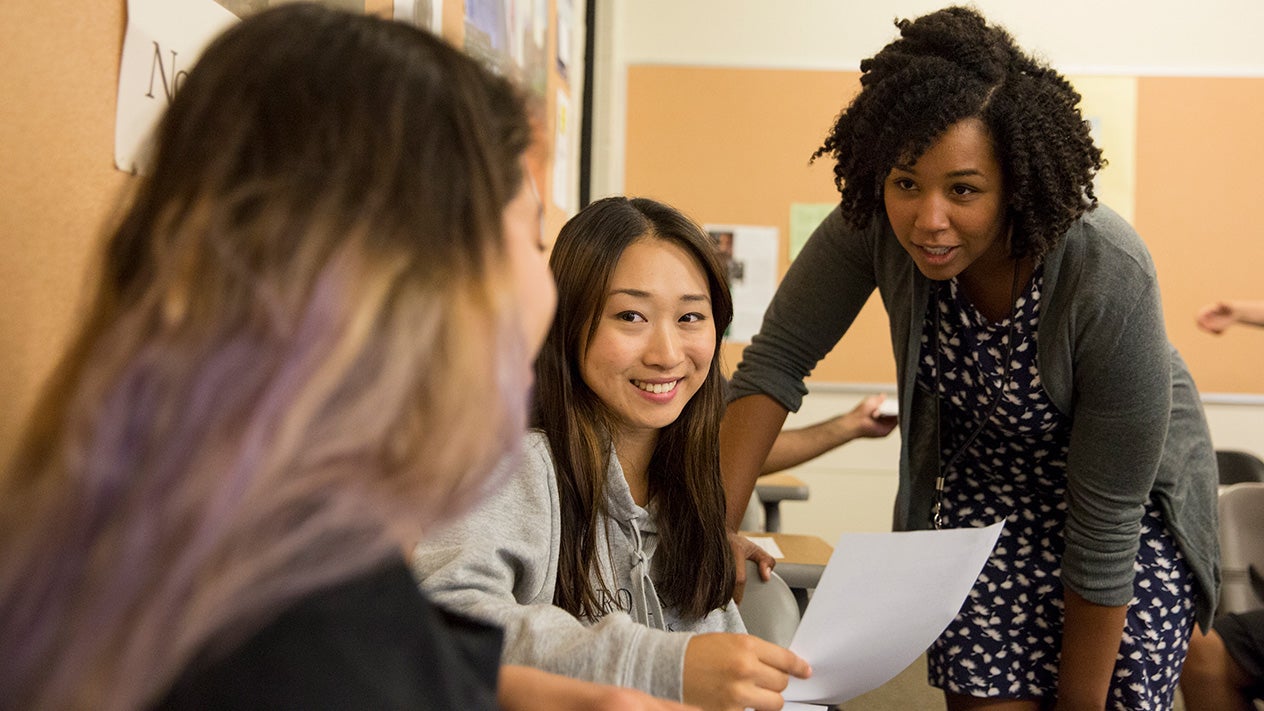Welcome to the Social Sciences Student Center. Visit us on campus or online to connect to peer tutors, counselors and support services.
Online Support
Access free, online support and tutoring in social sciences subjects.
Zoom Room
- Connect via Zoom
- A host will connect you with the next available tutor or counselor. Please complete the intake form the host shares with you in the chat and stay muted until your tutor or counselor is ready.
- Online support sessions typically last about 30 minutes (and can be longer if time allows).
Canvas Support Hub
The DVC Support Hub in Canvas can connect you with online ed planning tools, technology help, health and wellness services, basic needs support, career and transfer services, student life and more! Log in with your InSite username and password to access services.
NetTutor
NetTutor is available nights and weekends.
On Campus Support
Visit our collaborative work space on campus, where you can connect with peers, instructors and support staff in business and computer science. Here you'll find:
- computers
- wifi and charging stations
- small group and individual workspaces
- "Zoom Zones" - space to attend your online classes, with webcams and earbuds available
- peer tutors for drop-in academic support
- counselors for drop-in ed planning and/or personal concerns
- librarians for help with research and citations
Tutoring & Counseling Hours
Check back here often, as our online and on-campus hours are not always the same, and are subject to change.
-
Subject
- Mon: 12 p.m. - 5 p.m.
- Tues: 9 a.m. - 1 p.m.; 2 p.m. - 5 p.m.
- Wed: 10 a.m. - 2 .pm.
- Thurs: 9 a.m. - 5 p.m.
- Fri: 9 a.m. - 3 p.m.
Subject
- Wed: 3 p.m. - 5 p.m.
Subject
- Tues: 1 p.m. - 3 p.m.
- Wed: 1 p.m. - 4 p.m.
NetTutor is available nights, weekends and holidays when our Student Centers are closed.
-
Subject
- Mon: 12 p.m. - 5 p.m.
- Tues: 9 a.m. - 1 p.m.; 2 p.m. - 5 p.m.
- Wed: 10 a.m. - 2 .pm.
- Thurs: 9 a.m. - 5 p.m.
- Fri: 9 a.m. - 3 p.m.
Subject
- Wed: 3 p.m. - 5 p.m.
Subject
- Tues: 1 p.m. - 3 p.m.
- Wed: 1 p.m. - 4 p.m.
-
Wednesdays, 1 p.m. - 3 p.m.
Learn More
-
Why be a tutor?
- Tutoring is challenging, rewarding, and fun for both tutor and tutee.
- Tutoring is an excellent way for students to gain experience and insight, especially if you are considering teaching as a career.
- Tutoring experience is valuable for scholarship, college, and job applications as well as résumés.
- Tutoring is a useful tool to gain in-depth knowledge in a variety of subject matters.
- Tutoring gives you a rare opportunity to experience the dynamics of teamwork and thus contribute to the growth of the DVC campus community.
- Trained tutors are paid for their time tutoring.
- Employment as a tutor satisfies work-study and CalWORKs employment requirements.
How to qualify for a tutor position:
- Earn a 'B' grade or better in the class you want to tutor.
- Receive a written recommendation from the instructor of each class you want to tutor.
- Enroll in a Tutor Training Class (Math 140, English 140, or INTD 140) during the term when you are seeking employment. (Some labs require training before you work as a tutor, but others ask that tutors be enrolled in the tutoring training course in the same term you begin working as a tutor.)
- Speak, write, and understand English fluently and clearly.
- Be registered for 6 DVC-units minimum to qualify as a student worker. If you are an International Student, you must be registered for 12 units to qualify as a student worker.
- Not exceed 20 hours a week in your total workload on the DVC campus.
- Be eligible to work on campus.
- Make a commitment to work as a tutor for a minimum of two terms.
If you meet the 8 qualifications listed above and are passionate about helping others, please contact the tutoring program in your discipline, or contact EOPS for other tutoring opportunities. The different tutoring centers have different requirements and training for their tutors.
New tutors must have completed or currently be enrolled in one of the following in order to meet the training requirement to be eligible to tutor at DVC:
- English 140 (please see course schedule for more info)
- Math 140 (please see course schedule for more info)
- INTD 140 (please see course schedule for more info)
- Intensive tutor training workshop (contact specific tutoring center for more information)
Thank you for your interest in becoming a DVC Tutor!
-
As a result of using tutoring services, students will:
- Feel more confident in their learning and knowledge;
- Have an increased appreciation for the subject;
- Have an increased level of engagement in the subject;
- Be prepared to transition to more advanced concepts;
- Exhibit behavior that promotes success including:
- Asking questions in class and of the instructor;
- Participating in peer discussion;
- Visiting professor in office hours;
- Participating more in class;
- Procrastinating less;
- Taking notes;
- Feeling comfortable with tutoring and asking for help;
- Feeling more connected to classroom learning.
- Exhibit greater academic endurance and independent learning including:
- Having a willingness to attempt difficult material again and again and again (perseverance);
- Understanding available resources and how to access them;
- Learning strategies to be better able to think critically and solve problems independently;
- Recognizing the need for and have an improved understanding of key concepts and fundamentals;
- Be more successful.
